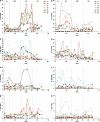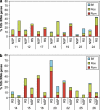Dominant and diet-responsive groups of bacteria within the human colonic microbiota
- PMID: 20686513
- PMCID: PMC3105703
- DOI: 10.1038/ismej.2010.118
Dominant and diet-responsive groups of bacteria within the human colonic microbiota
Abstract
The populations of dominant species within the human colonic microbiota can potentially be modified by dietary intake with consequences for health. Here we examined the influence of precisely controlled diets in 14 overweight men. Volunteers were provided successively with a control diet, diets high in resistant starch (RS) or non-starch polysaccharides (NSPs) and a reduced carbohydrate weight loss (WL) diet, over 10 weeks. Analysis of 16S rRNA sequences in stool samples of six volunteers detected 320 phylotypes (defined at >98% identity) of which 26, including 19 cultured species, each accounted for >1% of sequences. Although samples clustered more strongly by individual than by diet, time courses obtained by targeted qPCR revealed that 'blooms' in specific bacterial groups occurred rapidly after a dietary change. These were rapidly reversed by the subsequent diet. Relatives of Ruminococcus bromii (R-ruminococci) increased in most volunteers on the RS diet, accounting for a mean of 17% of total bacteria compared with 3.8% on the NSP diet, whereas the uncultured Oscillibacter group increased on the RS and WL diets. Relatives of Eubacterium rectale increased on RS (to mean 10.1%) but decreased, along with Collinsella aerofaciens, on WL. Inter-individual variation was marked, however, with >60% of RS remaining unfermented in two volunteers on the RS diet, compared to <4% in the other 12 volunteers; these two individuals also showed low numbers of R-ruminococci (<1%). Dietary non-digestible carbohydrate can produce marked changes in the gut microbiota, but these depend on the initial composition of an individual's gut microbiota.
Figures






References
-
- Abell GCJ, Cooke CM, Bennett CN, Conlon MA, McOrist AL. Phylotypes related to Ruminococcus bromii are abundant in the large bowel of humans and increase in response to a diet high in resistant starch. FEMS Microbiol Ecol. 2008;66:505–515. - PubMed
-
- Bird AR, Brown IL, Topping DL. Starches, resistant starches, the gut microflora and human heath. Curr Issues Intest Microbiol. 2000;1:25–37. - PubMed
Publication types
MeSH terms
Substances
Grants and funding
LinkOut - more resources
Full Text Sources
Other Literature Sources
Medical
Molecular Biology Databases

